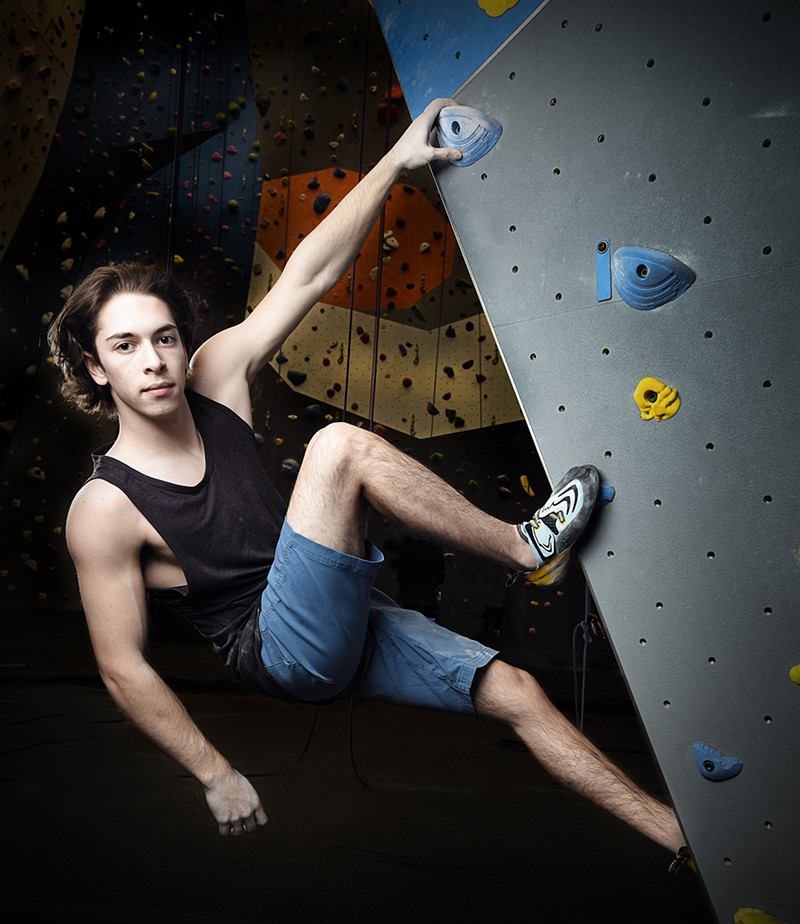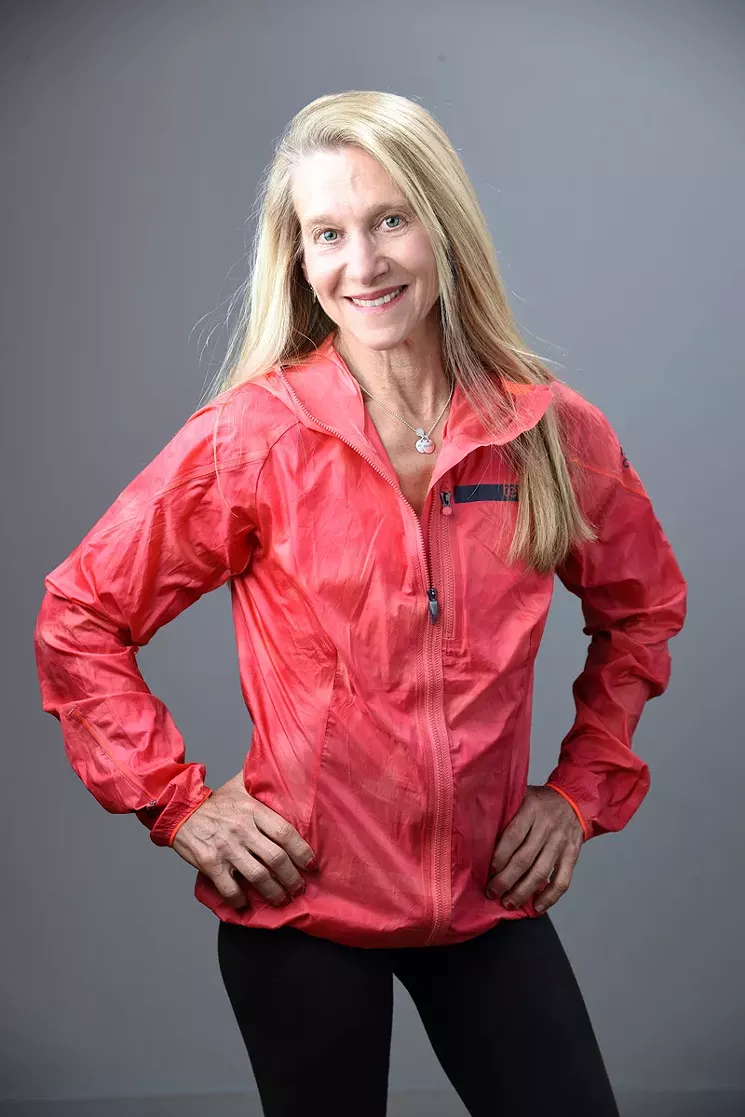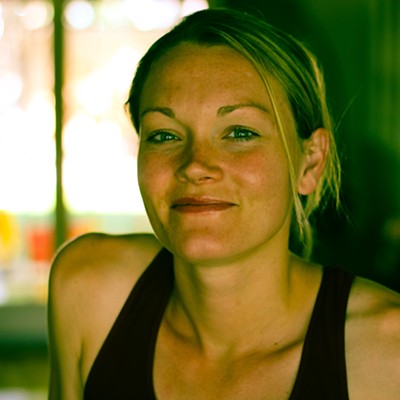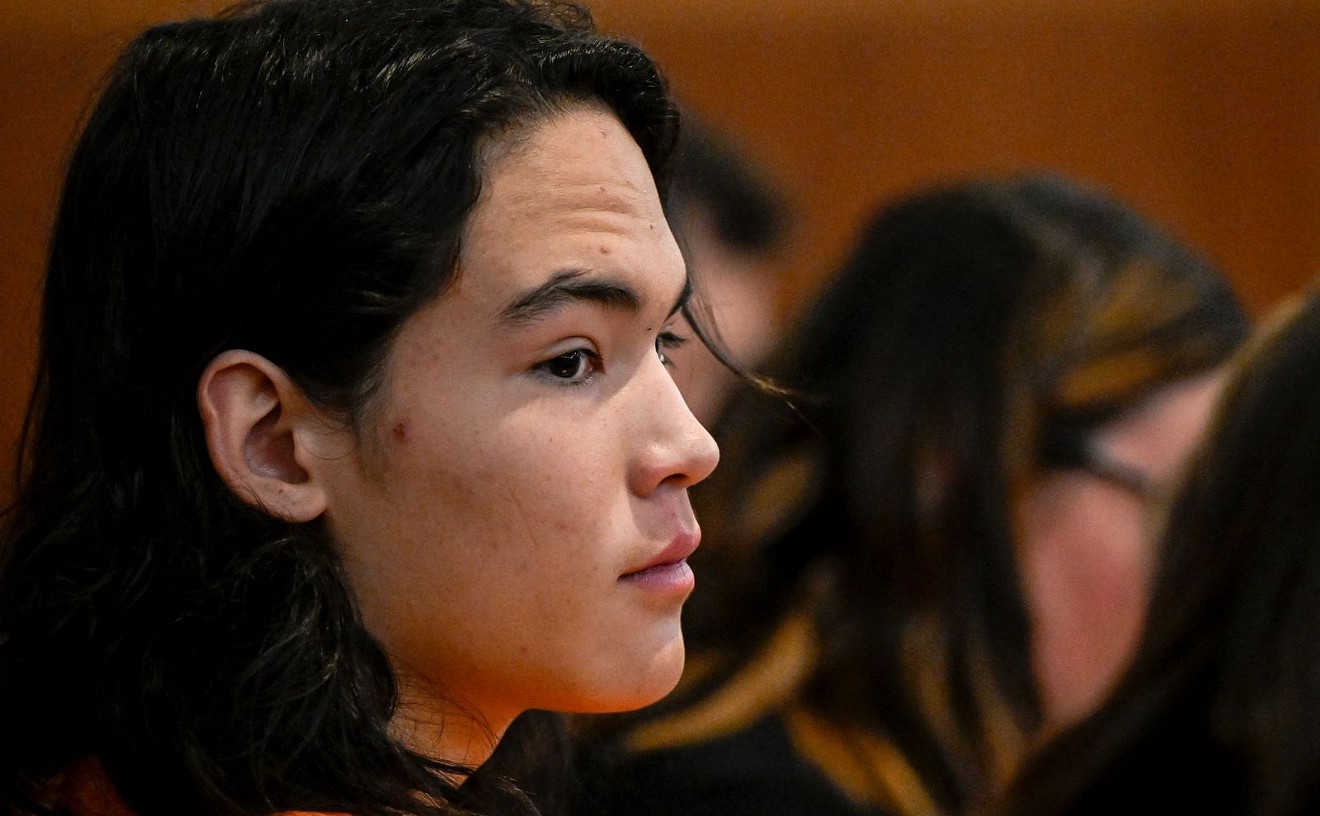Last September Jordan joined 750 athletes from seventy nations at the brand-new Innsbruck Climbing Center in Austria, where he was paired against his idol, 24-year-old Iranian climber Reza Alipour Shenazandifard, who holds the men’s 15-meter speed-climbing world record of 5.48 seconds. But he knew the best way to quell nerves: “I only think about speed when I’m on the wall.”
A three-beep buzzer sounded, and 6.38 seconds later, the two-time Youth National Speed Climbing Champion tapped a sensor at the top of the wall, earning a twelfth-place finish in speed climbing at Worlds.
“You have to trust yourself,” Jordan explains. “Once the race starts, it’s almost like you’re flying up the wall.”
“Once the race starts, it’s almost like you’re flying up the wall.”
tweet this
Jordan’s climbing career has been soaring lately. Beyond collecting accolades as a Youth National Champion last season, he is an MYA Vice World Champion and a Youth Pan-American Speed Climbing Champion who placed second at the Youth Bouldering National Championship two weeks ago, with a score that propelled him to the IFSC Youth World Championships this summer. He’s entered open-climbing competitions, too, competing against adult climbers in the USA Climbing Open Sport & Speed National Championship last March, where another second-place finish nabbed him a highly coveted speed-climbing spot on Team USA during the 2018 season.
Timing is everything: In 2016, the International Olympic Committee approved climbing for the 2020 Tokyo Olympics, after the host city submitted a proposal to include the sport.
Competitive climbing has three disciplines, and to qualify for a medal in 2020, Olympic hopefuls — only twenty contenders each in the men’s and women’s divisions — will all be required to participate in sport climbing, bouldering and speed climbing, a category that American climbers have largely ignored. While the inclusion of speed climbing might hinder other U.S. athletes, it could increase Jordan’s odds of securing a spot at the Summer Games.
At sixteen, the sky’s the limit for this Smoky Hill High School junior.

Jordan Fishman at USA Climbing's 2018 Youth Bouldering National Championship in Salt Lake City.
Jennie Jariel
Here’s how it works: Hooked into automatic belays, positioned side by side, two climbers race up identical 15-meter walls. The first to tap the sensor at the top of the route wins.
Moving at a casual pace, it might take a typical climber a minute or more to ascend a speed-climbing wall. Speed climbers, though, can finish in five to seven seconds.
“It happens so fast,” Jordan says. Every tenth of a second matters, and little things, such as “having your foot half an inch off,” are detrimental, he notes. A small slip might ruin an entire competition, and if you false-start or peel off the wall mid-climb, that’s it. Game over.
Speed climbing is standardized, meaning uniform holds — rock-like formations made from polyurethane resin — are placed in the same positions on every official speed-climbing wall, as determined by the International Federation of Sport Climbing, the nonprofit organization regulating, directing and promoting climbing competitions. Handholds, including the jug, punch and slopers, are identical throughout the speed-climbing wall, as are footholds.
While speed climbing is popular internationally and has been included in the World Cup Circuit for years, few American climbers have participated in the discipline. In fact, speed climbing has a reputation for being something of a joke in the U.S. “It’s the ugly stepchild of climbing,” says Will Anglin, a well-known youth climbing coach and the owner of Denver-based Tension Climbing, which designs and manufactures training equipment for climbers.
American climbers have largely discounted speed climbing because it removes elements they consider integral to the sport. “It’s one climb that doesn’t ever change, so there’s a lot less creativity and a lot less room to add your own experience and style,” explains four-time World Climbing Champion Robyn Erbesfield-Raboutou, owner and founder of ABC Kids Climbing in Boulder.
What’s more, the standard speed-climbing route is an easy climb — ranked 5.10 on a scale of 5.1 to 5.15. For climbers, a 5.1 is the equivalent of a walk on an easy and established trail, while a 5.4 might be a scramble.
Many climbers won’t use a rope until they hit 5.5 or 5.6, the thresholds to entry-level climbing. “Most beginners can do a 5.10 climb, no problem,” notes Erbesfield-Raboutou, who adds that the challenge isn’t the route. “It’s that athletes are trying to complete the route lightning-fast.”
With speed comes risk. Likening competitive climbing to track and field, Erbesfield-Raboutou compares speed climbing to a sprint. “It’s like jumping hurdles, because there are obstacles involved,” she says. “Speed climbers have to manage risk at a very high speed, and that’s what makes the sport so exciting to watch.”
Even so, speed climbing has yet to gain traction in U.S. climbing circuits. A handful of American gyms have speed-climbing walls, but Basecamp Reno in Nevada is the only one with an IFSC-certified wall, a requirement for establishing world records and hosting speed-climbing competitions.
Jordan has trained with Erbesfield-Raboutou at ABC Kids Climbing since 2015, when he joined Team ABC Boulder, the gym’s competitive team. Landing a spot on one of the most elite youth climbing teams in the country was a big honor, especially since Jordan had only been climbing for a few years.
Jordan Fishman didn’t set out to climb to the top. In 2012, when he was an Aurora fifth-grader, his dad, Tal Fishman, was searching for a hobby that he and his only son could enjoy together.
“I told him to find an activity he knew nothing about so it wouldn’t be one of those situations where Dad is telling his son how to do this and that,” recalls Stephanie Fishman, Jordan’s mother.
The father-son duo ended up at Rock’n & Jam’n in Centennial, where the novices rented some gear, hooked into automatic belays and messed around.
Six months later, Jordan was hooked. Indoor rock climbing was a natural fit for a daredevil who’d grown up scaling countertops and surmounting trees, giving his mom “more than one heart attack in sixteen years,” as Stephanie puts it.
Jordan had played recreational sports such as soccer and football, and he eagerly joined the youth climbing team at Rock’n & Jam’n. But by 2014 he’d topped out and was looking for a new challenge. “He wasn’t getting the intensity he needed,” Stephanie says. So Jordan did his homework, and ended up trying out for the youth climbing team at Earth Treks Golden, where he spent the next fourteen months training with Will Anglin.
The first thing Anglin noticed about Jordan was his tenacity. Young athletes were required to try out for Anglin’s team, and during tryouts, Anglin liked to take climbers outside of their range. “We’d purposely set them up to fall, just to see how they reacted to failure,” he explains. When faced with a route they weren’t ready for, most kids walked away. Not Jordan.
“Jordan was unwilling to be thwarted,” Anglin recalls, adding that when one attempt failed, Jordan would immediately employ a new plan. “That personality and thought process — that’s the first thing I look for in a student,” says Anglin.
By the time Anglin met Jordan, he had coached climbers on the youth circuit for a decade. “I can’t make someone good at climbing,” Anglin says, “but I can bring out whatever they already have in themselves.” From the get-go with Jordan, he knew that “training him was going to be really fun.”
Under Anglin’s auspices, Jordan focused on sport climbing and bouldering, since speed climbing wasn’t yet on the U.S. radar. Mental discipline was more important than strength training in those disciplines. At sport climbing and bouldering competitions, athletes are presented with a novel situation and tasked with “adapting their skills as quickly as possible,” says Anglin.
As Jordan’s problem-solving abilities grew, Anglin introduced strength workouts into his regimen. “He adapted well to strength training and got really strong really fast,” Anglin recalls.
Jordan credits Anglin with taking him to “the next level in climbing.” But by 2015, he knew he was ready to push into the highest tier…and Anglin knew it, too.
“He moved on to Team ABC Boulder, which is one of the top youth climbing teams in the country, possibly the world,” Anglin says.
Robyn Erbesfield started climbing in 1982, when a high school boyfriend and a few buddies took her on a rock-climbing excursion to Mount Yonah, a popular climbing destination in Georgia.
The boyfriend didn’t stick, but the sport did. “I knew immediately that [climbing] suited me perfectly,” says Erbesfield-Raboutou, and it didn’t hurt to have a group of high school boys marveling at her innate abilities on that first trip. “I’m still obsessed.”
There weren’t any climbing gyms in the 1980s, so Erbesfield-Raboutou rigged her garage with training devices, creating a makeshift facility that would suffice when the then-eighteen-year-old couldn’t train outdoors. “Even when I went to my first World Cup, in 1988, a lot of my training was done in home gyms,” Erbesfield-Raboutou recalls.
She met her future husband, Didier Raboutou, a French National champion, in the early 1990s at a climbing competition in Paris. After a few years of long-distance dating, splitting their time between the U.S. and France, they settled in Colorado.
When they launched ABC Kids Climbing in 2003, it was the first kids-only climbing gym in the country. “I started ABC Kids Climbing because my kids, who were two and five at the time, showed an incredible passion for climbing,” Erbesfield-Raboutou explains.
To excel, she decided, her children needed a space all their own: “That’s how we developed the concept for a climbing gym with child-sized walls and apparatuses.” Sixteen years later, ABC Kids Climbing is still a national and international leader in youth climbing, and a model for a slew of climbing gyms across the country. “We have 120 kids on our competitive team and over 300 youth who climb recreationally,” says Erbesfield-Raboutou.
Her gym is known for being “elite,” but she doesn’t particularly love that terminology. “We also cater to beginners and brand-new climbers,” she says. “I’m really proud that we have a program that’s accessible to all levels.”
The staff is another point of distinction at ABC Kids Climbing. “We hire passionate coaches and instructors who love working with kids,” Erbesfield-Raboutou explains. “Our goal is to spread our concept and passion across the country.”
On Team ABC Boulder, Jordan practiced all three climbing disciplines, though his trainers initially emphasized sport climbing and bouldering. Then Jordan met John Brosler, one of the rare American climbers to excel in speed climbing, a national champion holding the current U.S. record for the 10-meter wall.
While working toward his bachelor’s degree at the University of Colorado Boulder, Brosler trained Jordan at ABC Kids Climbing, moving the young athlete into speed climbing. “I loved the fact that it happened so fast,” Jordan recalls.
Learning to speed-climb at ABC Kids Climbing had certain obstacles, though. The IFSC has to certify a wall if it’s going to be used for an official competition or speed record, and gyms can easily build their own unofficial routes by ordering official holds and setting the course according to the IFSC’s specifications. But the kid-friendly climbing walls at ABC don’t extend 15 meters. “We have three sections of the standard speed wall,” explains Erbesfield-Raboutou.
So for several years, Jordan supplemented his training at ABC Kids Climbing by flying out of state to climb on 15-meter walls in Detroit, Utah and Atlanta. In mid-2018, though, Earth Treks opened a facility in Englewood that claims Colorado’s only 15-meter speed climbing wall. Now it’s easy for him to climb high and fast on his home turf.
The high school junior trains in three-hour blocks four days a week, fitting in his twelve-plus hours of practice after school, upping the ante during school breaks. In July, when he’ll be gearing up for the 2019 USA Climbing Sport & Speed Youth National Championships, Jordan will attend a rigorous two-week training camp in Atlanta.
“When I’m competing against people who have graduated — people who don’t have school all day — it’s hard,” Jordan admits.
Staying focused is another challenge, one most athletes encounter. “There are days when I go to the gym and I don’t want to be there,” he admits. “You just have to push through it.”
And he does, because even with the occasional burnout or case of ripped calluses, Jordan can’t go more than a few days without climbing. “Otherwise, he’s bouncing off my walls,” his mother says.
Outside the gym, Jordan tries hard to be a normal teenager. “I like to hang out with friends on the weekends,” he says. If he isn’t catching a movie at the theater, he might be at Top Golf or one of his favorite local restaurants. He’s known many of his buddies since grade school and says they’re all “super-supportive” of his athletic obligations.
Dozens of changes have been made to the Olympic program since the first modern meet in Athens in 1896 — and climbers worldwide are excited to see their sport finally represented in 2020.
Before making its debut as an Olympic event, a sport has to be recognized by the International Olympic Committee. In an effort to boost ratings and help host cities attract sponsorships, the IOC gives all future host cities an opportunity to introduce new events. Soon after winning the 2020 bid, Tokyo organizers began lobbying for sport climbing, given the pastime’s widespread popularity throughout Japan, particularly among young athletes. That helped Tokyo nudge the sport into the Summer Games, as the IOC has begun emphasizing events with youth appeal.
With a new Olympic event in the offing, some American climbers who have glossed over speed climbing in the past are giving the sport another chance. At the 2020 Summer Games in Tokyo, only forty Olympic qualifiers (twenty men and twenty women, only two of each per country) will participate in a combined competition: All athletes will have to compete in sport climbing, bouldering and speed climbing.
“It’s an odd thing to put an athlete through,” says Anglin. “It’s like asking a sprinter to also run a marathon.”
To get to that point, American climbers can follow several pathways.
From August 11 through August 22, the IFSC will host its 2019 World Championships in Hachioji, Japan, where athletes can compete in individual disciplines — sport climbing, speed climbing or bouldering — or a combined event melding all three. The top twenty athletes in the overall ranking will advance to the Combined World Championships, also held in Hachioji, where the top seven athletes per gender will get passes to the Olympics.
USA Climbing chooses which American climbers go to IFSC’s World Championships. “Being on one of our national teams doesn’t guarantee you a spot in the combined portion of the World Championships,” explains Zachary Brinchi, USA Climbing’s marketing and communications manager. “Athletes must place in the top twenty in the overall ranking at World Championships to advance to the Olympic-qualification portion of the competition.”
USA Climbing can only send a few of its climbers to the World Cup Championships —the four men and women on its U.S. Overall National Team, plus the next two highest-ranked athletes per gender, based on overall national rankings. The organization is currently determining which athletes will be on its national teams during the 2019 season. In addition to the U.S. Bouldering, U.S. Sport and U.S. Speed teams, USA Climbing also puts together a U.S. Overall National Team consisting of eight athletes — four male, four female — who compete in all climbing disciplines. Members from this team are well-positioned to make it to the World Championships.“There are days when I go to the gym and I don’t want to be there.”
tweet this
Four primary events determine who makes it onto the U.S. Overall National Team: the Combined Invitational, which was held last month; the Bouldering Open National Championships, held earlier this month; and the Sport and Speed Open National Championships, set for March 8 and 9 at Sportrock in Alexandria, Virginia. Athletes earn ranking points at these national events, and those with the highest results qualify for USA Climbing’s U.S. Overall National Team.
“Everything’s up in the air right now,” says Jordan, who finished thirteenth in the Combined Invitational in January. But even if he isn’t selected next month to represent the U.S. on its Overall National Team, Erbesfield-Raboutou points out, “If he’s first in line to be the specialist for speed, then he could go to the World Championships.”
That’s not much of a stretch, considering that last year, Jordan finished second in speed climbing at USA Climbing’s Sport and Speed Open National Championships, earning his current spot on Team USA. And even if he doesn’t attend the IFSC Climbing World Championships, depending on where he sits in the overall World Cup Season Ranking, Jordan could still head to the Olympic trials in Toulouse, France, at the end of November.
The twenty highest-ranked athletes per gender not yet qualified after World Championships will be invited to participate in the Olympic qualifying event; the top six competitors in each gender will be bound for the Summer Games.
And there’s still another way to get to the Olympics, Erbesfield-Raboutou says, pointing to five Continental Championships, including the IFSC Pan-American Championships at Sender One Climbing in Los Angeles in 2020. The winner of this event will secure a spot at the Olympics, assuming the quota spots for the athlete’s country have not already been met.
“Jordan is very young. He’s the youngest,” says Erbesfield-Raboutou. “But he’s also one of the best in his discipline.”
Jordan would like to go to the Olympics. He knows he’s young, but there’s no guarantee that sport climbing will stick around as an official event; it’s only confirmed for the 2020 Summer Games.
So he keeps pushing. Seeing other athletes rising in the ranks brings out his competitive spirit, but most of his drive comes from within.
How can I beat myself? How can I get better at what I do? Jordan contemplates those questions daily. “As an athlete, you’re always looking at your opponent, and I guess I see myself as an opponent, too,” he explains. “I know that I can always push myself harder.”
And faster.
















